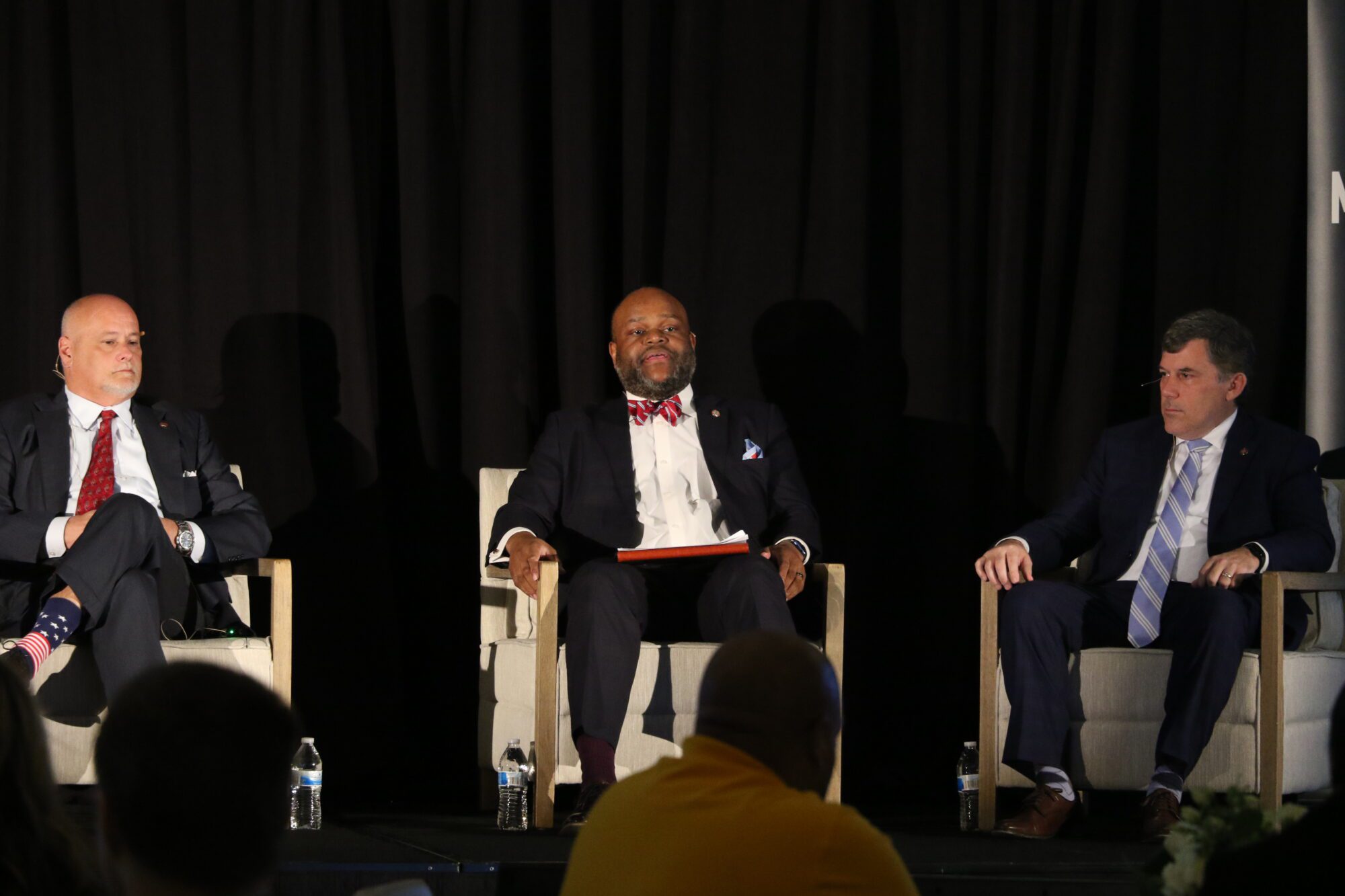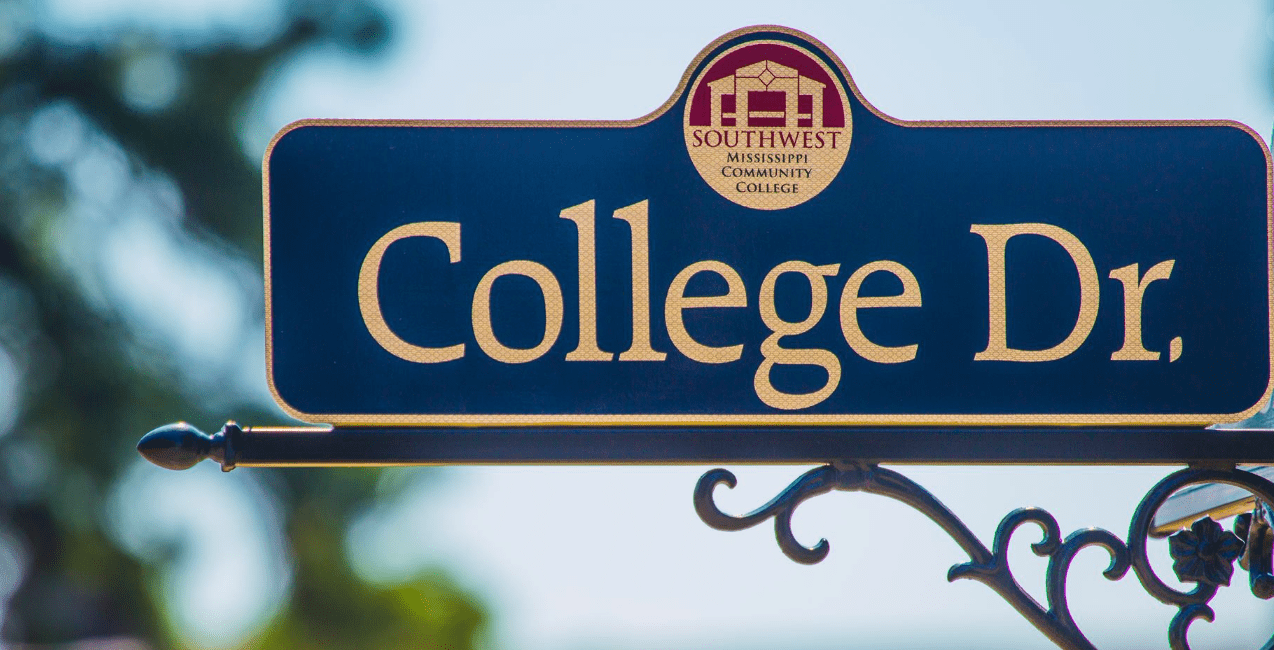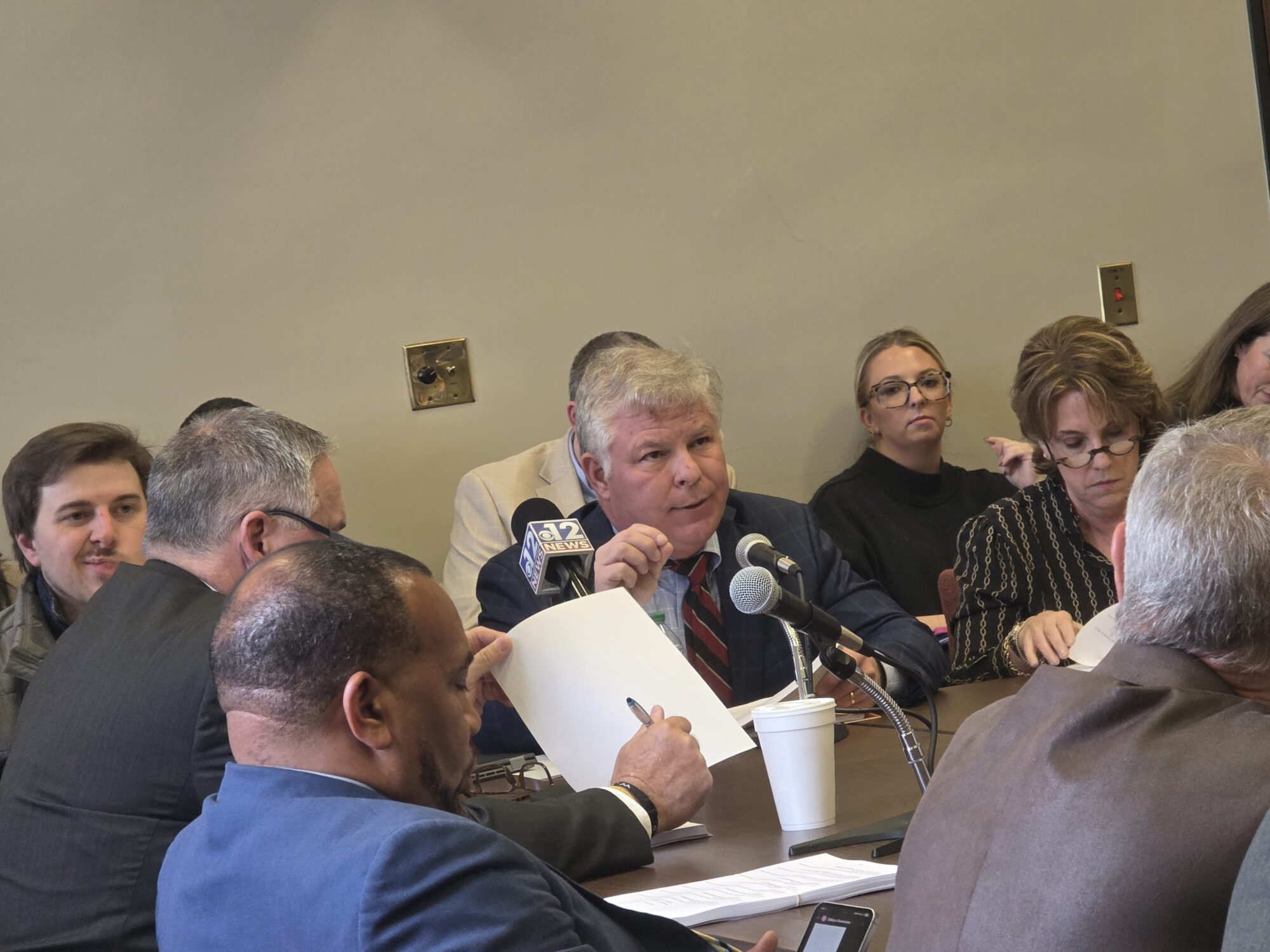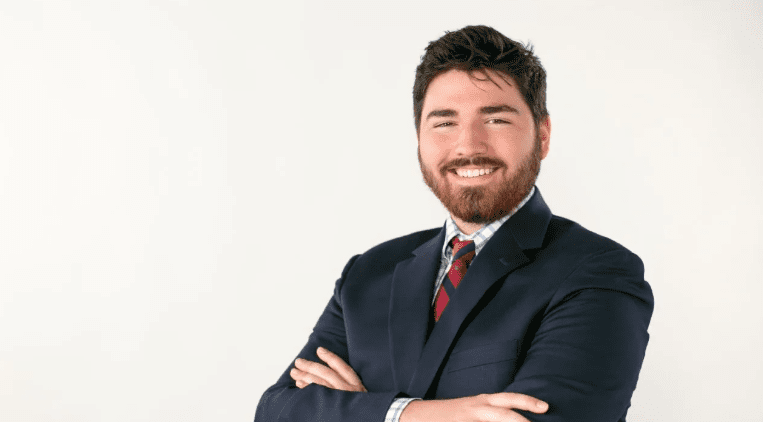446 letters written for Scruggs, his son, Backstrom
Richard P. Ieyoub, a three-term Louisiana attorney general, wrote about the landmark state settlements with tobacco companies, an effort Scruggs led: “Obviously, Dickie’s legal ability had much to do with his accomplishments, but it was his character that garnered the respect and confidence of attorneys general across our nation.
“Few would have been able to field such a formidable and united team, but no attorney general could deny the courage and conviction that fortified Dickie’s efforts, and it became our honor to have taken our roles in the pursuit of his ‘absurd little theory’.”
Pascagoula musician Libby Watson, Scruggs’ sister-in-law, noted Scruggs mother, Helen, had died two days before Katrina.
“Despite the death of his mother, Dickie flew to the Coast daily helping all his family, friends, neighbors and strangers. He did all this, once again, without hesitation or fanfare and at his own expense. He took no time to grieve his own loss until everyone was taken care of. He is not a greedy rich man that the press makes him out to be. He shares with others the wealth he is blessed to have.”
William Winter recruited Scruggs to join his Jackson law firm in 1977. The former governor talked about Scruggs’ financial support for community causes and his devotion to his wife and two children, Zach and Claire.
“I make these observations purely out of my genuine interest in and concern for a long-time friend who has made a grievous mistake. I hope that they will be considered appropriate and helpful.”
Vaughn L. Grisham, professor and director, in the Ole Miss College of Liberal Arts: “In the entire history of the University of Mississippi, no one has given so generously to the Liberal Arts, which is the heart and soul of our school. Because of their gifts, we have been able to retain distinguished professionals and add to their numbers. When I thanked Dick personally, he deferred with good humor by saying “… well, much of the money was (wife) Diane’s.”
Lowell Bergman wrote about a stalemate in the $248 million, multi-state tobacco settlement when Brown & Williamson refused to let whistle-blower Jeffrey Wigand off the hook: “Mr. Scruggs told the industry the deal was off. That meant he might not be able to collect literally tens of millions or more in fees.
“At the time that stalemate impressed everyone, when he declared, ‘We’re not going to leave any soldiers on the battlefield.’ In the end the company relented and this historic deal was done.”
Carla G. Todd, Jackson County Chamber of Commerce president and CEO, worked for Scruggs until he closed his Moss Point practice in 1999, giving his employees generous severance packages: “In 2001, I was faced with the worst tragedy of my life when my oldest son was killed. He had graduated valedictorian from his high school and was on a full engineering scholarship when he was shot by a jealous classmate from his high school.
“There is not much I can remember about that particular day in December but I do remember looking through the same window (where) my son was shot while home on Christmas break and seeing Richard Scruggs walking up the sidewalk at my home. He was there to offer anything I needed. We both knew that this was one thing he could not ‘make better for me.’ He did take care of all of the funeral expenses of my son. That was not necessary for him to do, but that is what Dick Scruggs is all about.”
Pascagoula attorney Charles J. Mikhail, the Mississippi Bar’s disciplinary counsel for eight years and former chairman of the Committee on Professional Responsibility, said Scruggs always complied meticulously with professional and ethical rules.
He wrote: “Regrettably, this court’s involvement with Dick has been in connection with his moment of weakness; it has not experienced, on a daily basis, his strengths and goodness.
“Recall William Shakespeare’s famous words in the play Julius Caesar: ‘The evil that men do lives after them; the good is oft interred with their bones.’ Nevertheless, Dick’s failing does not change all the good he had done and the enormous credit he deserves for changing so many people’s lives for the better.”
Marty Milstead of Madison, whose parents lost their Pascagoula home to Katrina, wrote: “Dick made sure that my mom and dad had something to eat every day. Dick offered and provided a way for my Mom to take a hot shower and have a decent night of rest when those usual common conveniences were not available after Katrina… . Dick made arrangements to have fuel brought in to Pascagoula when there was no gasoline available. He offered gasoline to anybody that needed it in 10 gallon containers for free.”
Drew Ranier, a Lake Charles attorney who has worked closely with Scruggs for 15 years, said: “He is one of the most skillful and courageous lawyers in the United States, and has often risked his fortune and reputation for the greater good. More than any other lawyer in this country, he has been the spokesperson for individual rights and liberty in matters of civil justice, and has dedicated his life and his resources to this work.
“When Dick worked on a case, millions benefited. He relished working on cases that addressed far-reaching and pervasive legal problems.”
“… He has admitted to a grievous error, but it is a marked aberration in a man whom I repeatedly saw do the right thing for many years. What he has given to all of us is unprecedented. The loss of his right to practice law will in itself be a profound and devastating punishment to this man who is one of the great lawyers of our time. Please judge him with leniency commensurate with the totality of the life that he has lived.”
Attorney William N. Reed, who has known Scruggs since 1975, when they left military service and entered law school: “It is beyond me to understand how a man of integrity, compassion and generosity could have made the poor decisions that Dickie admittedly made.
“However, I have talked at length to Dickie and believe that he fully accepts responsibility for those decisions and understands that he will be punished for doing so. My sincere hope is that the severity of his punishment will reflect the fact that at all other times he has been a model husband, father, friend attorney and citizen.”
Aubrey K. Lucas of Hattiesburg, former USM president, wrote about Scruggs’ generosity to Ole Miss: “His unprecedented gift to the liberal arts was a persuasive item in the acquiring of a Phi Beta Kappa Chapter, which enhanced the image of the University of Mississippi and all of public higher education in Mississippi.”
Kay W. Garrett, senior development officer at the Piney Woods School, said: “Mr. Scruggs has been a major donor as well as a board member of The Piney Woods School for many years.
“In 1998, he made the lead gift for a $3 million addition to the schools Zilpha Chandler Library. That gift was instrumental in providing disadvantaged students from Mississippi, and from across the United States, with a state-of-the art media center.”
He was honored last year as their Philanthropist of the Year.
Biloxi attorney Russell S. Gill said he was involved with Scruggs in a 1980s Senate Committee investigation of contracting practices at Ingalls shipyard. Both cooperated with a “60 Minutes” investigation.
“As a result, there were Senate hearings dealing with practices at the shipyard that resulted in major changes to the way the shipyard was doing business with the government which I believe resulted in the taxpayers being protected, and Government funds conserved.”
Joseph F. Rice of the Motley Rice law firm in South Carolina, who worked with Scruggs on asbestos and tobacco cases, believes altruism, not money, motivated Scruggs to take on that monumental work. He recalled Scruggs dealing with clients, including widows of men who died from lung disease caused by asbestos exposure: “I personally observed how Dickie tried to comfort the widows and his elderly clients. He truly cared for them and for their cases.”
David Shelton, who was with the Scruggs Law Firm in Oxford, said: “I am personally sickened every time I read about or hear of people assassinating Dick’s character, when those people do not know him. Dick has acknowledged his mistakes and errors in judgment, and I believe he has taken responsibility for the decisions he made.”
Mary Spencer of Pascagoula wrote: “Eleven years ago, my husband was diagnosed with cancer and had to have surgery in Memphis, Tenn. In a happenstance meeting in the grocery store, Dick offered to fly David to Memphis so that we would not have to drive before and after the surgery.
“We rode with him and the pilot up there. At our convenience Dick sent the pilot and plane back to transport us home five days later. I cannot tell you how much it meant to David and me. It was a caring gesture from a friend who expected nothing in return.”
Ariel R. Taylor of Pascagoula raised college tuition and expense money for a high school student who failed to receive a scholarship. “Dick asked me how much more I needed and he gave me that amount.” Each time Scruggs ran into the young man in Oxford, he gave him money. He’s now a junior high school teacher and coach.
More than one person recounted how Scruggs has dressed up for the birthday parties of his grandson, Jackson, in an old Navy flight suit and cowboy attire.
Susan S. Thomas, who bought an Oxford condo next to the Scruggses in 2000, said: “What I am sure of is that no matter what sentence that is bestowed on Dick and his family, it will never hurt more than the shame of all that he has lost so far. They will never recover from the public humiliation and embarrassment of this whole ordeal. What is most precious to them right now is their time together.”
Claire Jo Tuepker, who hired Scruggs to sue State Farm after Katrina, wrote: “He offered us hope but at the same time stressed that it would not be easy and the outcome might well go against us. We talked of simple justice much more than money.
“Throughout the long anxiety-provoking process, Mr. Scruggs personally kept us informed – he even once visited us in our FEMA trailer and graciously accepted a dozen home grown eggs from our free-range Katrina chickens. Again, I was struck by his humility. He took the time to go with us to a gutted home we were thinking of buying as a way out of that trailer.”
Michael T. Webster of Florida, a Navy pilot with Scruggs and the one who suggested he name his son Zach, described a man with unprecedented nerve and courage. Scruggs was chided for having too much ‘John Wayne’ in him.
Jeffrey Wigand, the tobacco whistle-blower who works with Smoke-Free kids, wrote: “I owe Dickie my life, my success in getting the truth to the world, the lives I save on a daily basis, a bond of friendship that was made in the caldron of molting steel, always faithful when needed and a source of unfettered moral guidance.”
Mitchell Zeller of Maryland, formerly of the U.S. Food and Drug Administration, remembered Scruggs called one time to say Newport cigarettes were being sold in packs of 10 to attract poor smokers. Scruggs sent several packs to Zeller in Washington the next week. It was an important visual proof of industry misbehavior.
“I look back at the course of tobacco control efforts in the U.S. over the past 14-plus years and can state unequivocally that Dick Scruggs made seminal contributions to reducing the death and disease from tobacco use.”
Attorney David B. Howorth, an Oxford attorney who practiced for many years elsewhere, asked that Scruggs be given “the severest sentence possible.”
“What motivates me to write this letter is my concern about the extent to which Mr. Scruggs’ crime had been minimized by prominent members of Mississippi’s bar. I’m afraid that the result has been that many non-lawyers, taking their cue from these leaders, have concluded that bribery of judges is nothing to be alarmed about, that it is just business as usual for ‘high-powered’ lawyers.”
Howorth also is concerned about the Mississippi Bar’s less than “vigorous” pursuit of action against Scruggs and the state’s failure to bring charges against him.
Laurie R. Williams of Madison, an attorney, received a law degree in 1985 at Ole Miss; she does not know Scruggs but hates the reputation his behavior conveys:
“I am so heart sick that a few greedy attorneys have turned the tide of opinion against those truly honorable lawyers who really want the best for their clients. When you look at the wall of shame, it was rare to see a member of the bar depicted there. Most of the young lawyers coming out of school want to be on the get rich quick track. How sad that what once was an honorable profession has turned to a get rich quick scheme.”
Duane F. Hurt, a Greenwood dentist, said he knows the judge is being inundated with letters seeking leniency. “It seems to me the defendants have debased and eroded the foundation of our legal system – the very trough into which they have buried their snouts and off of which they have gotten fat.”
The Mississippi Bar sent a statement from president Bobby Bailess saying the defendants’ crimes “undermine the very foundation of our legal system.”
Letters for Scruggs’ co-defendant Sidney Backstrom included one from his wife, Kelli:
“Sid’s father, (Coast Circuit) Judge (James) Backstrom, was so highly regarded and Sid even feels he has ruined his father’s legacy.
“The remorse Sid feels already is indescribable. I’m not sure how much more one should be made to suffer for a mistake.”
Ole Miss Chancellor Robert Khayat wrote a letter for Backstrom, too: “I know him to be a man of high moral character with a strong commitment to his wife and three children. I also know that he is a highly respected member of the Oxford community.”
Zach Scruggs’ best friend wrote to say Zach never had a sense of entitlement, forging his own path and career. “Zach thinks for himself and has always held himself accountable for his own actions.” Zach’s wife is Amy.
Charlene Bosarge, who worked many years as Dickie Scruggs’ assistant in Moss Point, wrote about Zach Scruggs: “I watched Zach meet with many, many Hurricane Katrina victims and some had very little coverage, but he spent as much time with them as he did those with much larger claims. I too suffered a great loss during Hurricane Katrina – many times while outside trying to salvage the little belongings that I had left, I would look up and there was Zach as dirty as I was because he had been working with family members and friends who were doing the same thing I was doing. He always made sure that my family had everything that they needed.”
David Shelton, formerly of the Scruggs Law Firm, doesn’t think jail time for Zach Scruggs would serve his family or the public interest. “It is impossible for me to put into words the punishment that Zach is suffering and will continue to suffer as a result of being unable to practice law.
Pascagoula police officer and Scruggs Katrina client Paul Leonard wrote letters for Dickie and Zach Scruggs: “I know a man who can admit his faults is a man who can rise above them.”
Randy Peresich Mueller of Page, Mannino Peresich & McDermott law firm in Biloxi said: “Despite his family’s wealth and political connections, Zach has never sought to ‘get by’ or take the easy way in reaching his goals. Instead, he worked harder than most to attain good grades and become a positive force in other people’s lives.”
Sun Herald
6/26/8







